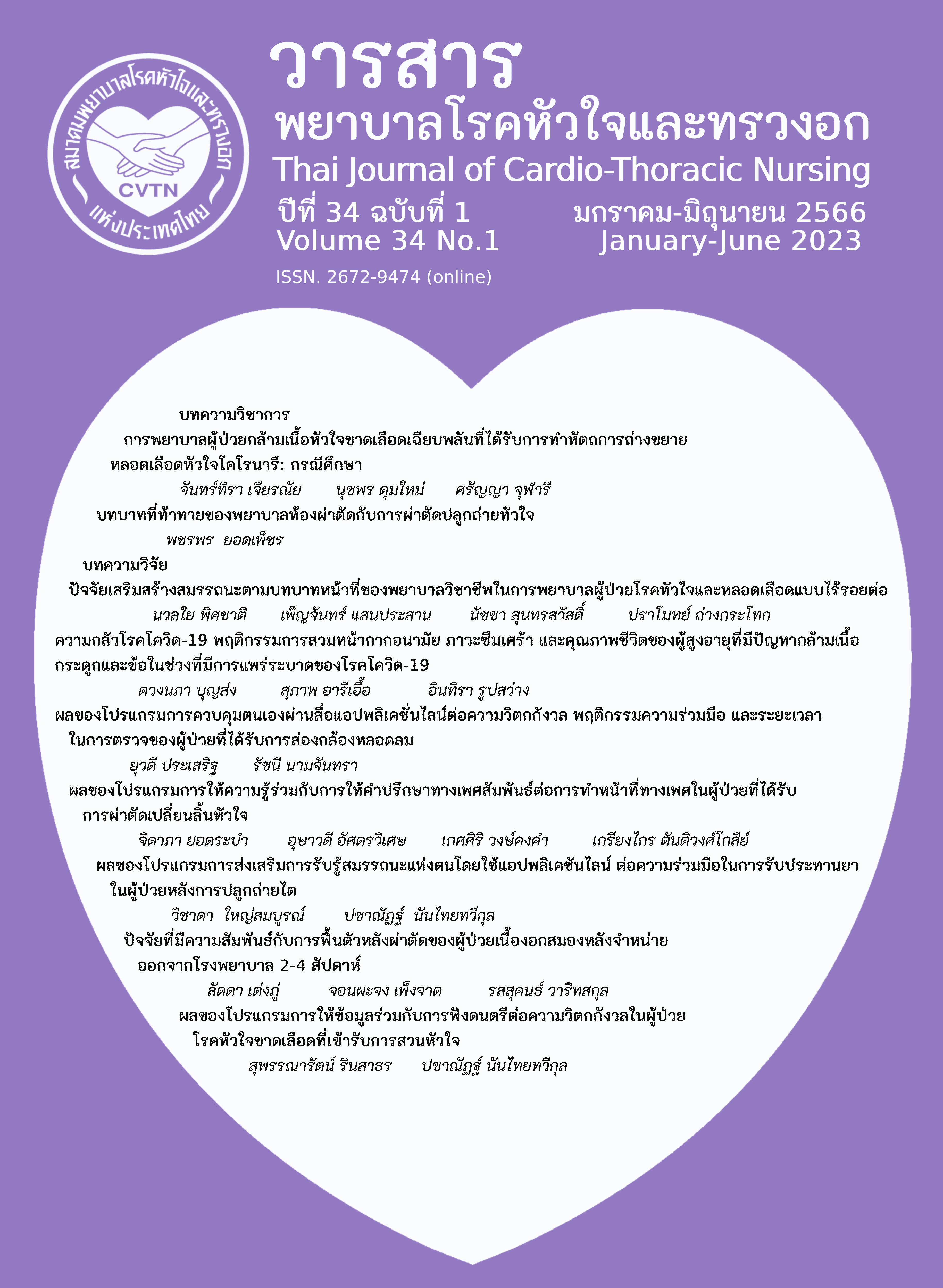Factors affecting functional nurses’ competencies for seamless nursing care for patients with cardiovascular diseases
Keywords:
patients with cardiovascular diseases, seamless care, functional competencies, professional nurseAbstract
The purpose of this qualitative research was to explore the factors enhancing functional nurses’ competencies in providing seamless nursing care for patients with cardiovascular diseases from the experts’ perspective in nursing quality improvement. A purposive sample of 18 nurses who had experience in seamless cardiovascular nursing care were selected as three nurse members of the cardio-thoracic nurses’ association, 14 executive nurses, and two nursing instructors. The data were collected through semi-structured interviews and audio recordings. The qualitative data were analyzed using content analysis.
The results showed that factors affecting nurses’ functional competencies in providing seamless nursing care for patients with cardiovascular diseases encompassed five components as follows: 1) management factors; 2) self-importance in work factors; 3) positive interactions among team member’s factors; 4) technology and innovation, including research factors; and 5) increasing the value of self-awareness of work.
The findings of this research can serve as a guide for nursing administrators in developing competencies that align with the professional roles of nurses in providing seamless care for patients with cardiovascular disease. This factor can significantly contribute to improving the quality of care received by patients with cardiovascular disease.
References
World Health Organization. Cardiovascular diseases. Geneva: WHO Headquarters; 2021.
Sanprasan P, Wattradul D, TejangKura L, Pitsachart N. Factors promoting seamless health services of cardiac nursing networks. Thai Journal of Cardio-Thoracic Nursing. 2017;28(2):154-67.
Spehar AM, Campbell RR, Cherrie C, Palacios P, Scott D, Baker JL, et al. Seamless care: safe patient transitions from hospital to home. In: Henriksen K, Battles JB, Marks ES, Lewin DI, editors. Advances in Patient Safety: From Research to Implementation (Volume 1: Research Findings). Rockville (MD): Agency for Healthcare Research and Quality (US); 2005.
The Welsh NHS Confederation. Written evidence submitted by the Welsh NHS Confederation (BAT0001). New York: The Welsh NHS Confederation 2018.
MacKinnon NJ, Sanmartin C. Middle of the health care pack: Canada's performance in the 2007 Commonwealth Fund international survey. Can Fam Physician. 2008;54(7):965-6, 70-1.
Jaunwanpen K, Siritarungsri B, Saejueng B. The development of a case management model for patients with acute myocardial infarction. The Journal of Boromarajonani College of Nursing, Nakhonratchasima. 2014;20(1):80-94.
Saenprasarn P, Jamsomboon K. Knowledge management in cardiac nursing: quality improvement. Thai Journal of Cardio-Thoracic Nursing. 2013;21(1):84-96.
Creswell JW, Creswell JD. Research design: qualitative, quantitative, and mixed methods approaches. Fifth ed. Los Angeles: SAGE; 2018.
Yang H-C, Ju Y-H, Lee Y-C. Effects of job stress on self-esteem, job satisfaction, and turnover intention. Journal of Transnational Management. 2016;21(1):29-39.
Thoits PA. Stress and health: major findings and policy implications. J Health Soc Behav. 2010;51 Suppl:S41-53.
Rosen MA, DiazGranados D, Dietz AS, Benishek LE, Thompson D, Pronovost PJ, et al. Teamwork in healthcare: Key discoveries enabling safer, high-quality care. Am Psychol. 2018;73(4):433-50.
Sitton-Kent L, Humphreys C, Miller P. Supporting the spread of health technology in community services. Br J Community Nurs. 2018;23(3):118-22.
Khoyun S, Sukontawat W, Kitkhuandee B, Loomon J, Thoin P. The critical care competencies of registered nurses after finishing short course training in critical care nursing. Chiangrai Medical Journal. 2020;12(2):88-102.
Yang F, Jiang Y, Pu X. Impact of work value perception on workers' physical and mental health: evidence from China. Healthcare (Basel). 2021;9(8).
Downloads
Published
How to Cite
Issue
Section
License
Copyright (c) 2023 Thai Journal of Cardio-Thoracic Nursing

This work is licensed under a Creative Commons Attribution-NonCommercial-NoDerivatives 4.0 International License.
บทความนี้ยังไม่เคยตีพิมพ์หรืออยู่ในระหว่างส่งไปตีพิมพ์ในวารสารอื่น ๆ มาก่อน และกองบรรณาธิการขอสงวนสิทธิ์ในการตรวจทาน และแก้ไขต้นฉบับตามเกณฑ์ของวารสาร ในกรณีที่เรื่องของท่านได้ได้รับการตีพิมพ์ในวารสารฉบับนี้ถือว่าเป็น ลิขสิทธิ์ของวารสารพยาบาลโรคหัวใจและทรวงอก






